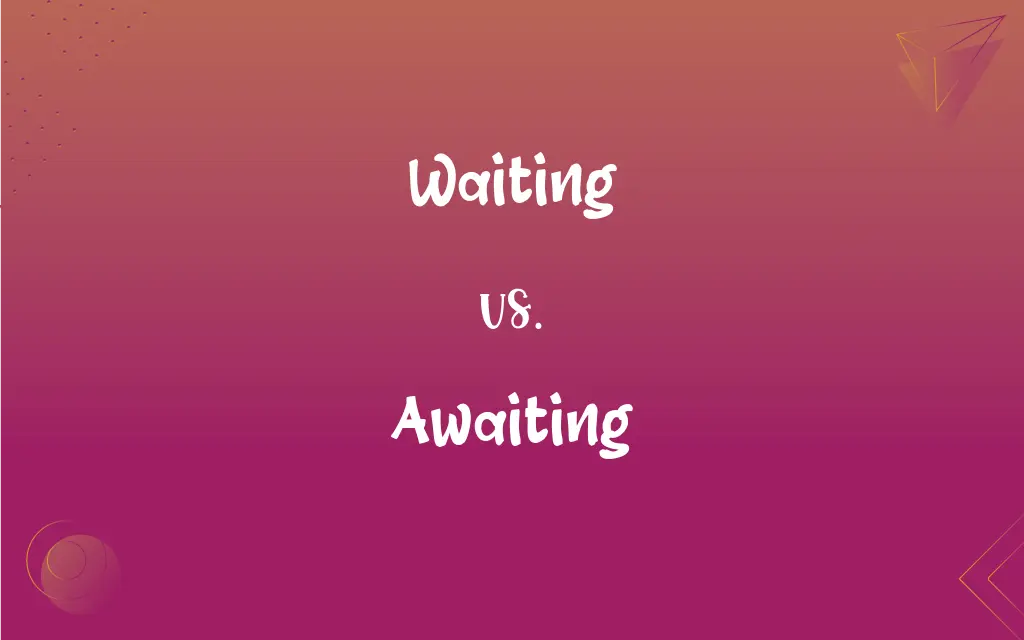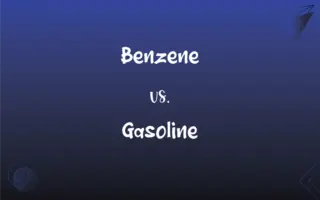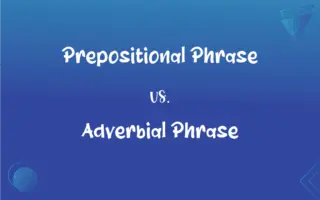Waiting vs. Awaiting: What's the Difference?
Edited by Aimie Carlson || By Janet White || Published on January 21, 2024
Waiting is the act of delaying action or remaining inactive until something happens, whereas awaiting specifically implies expectation or anticipation of something.

Key Differences
Waiting is a general term that describes the action of delaying or pausing before something occurs or until a particular condition is met. It does not necessarily imply expectation. Awaiting, in contrast, specifically denotes expectation or readiness for something to happen, often implying that the outcome is inevitable or certain.
The word waiting can be used in a broader range of contexts and is more commonly used in everyday language. It can be applied to situations where there is no direct object. Awaiting, however, is a more formal term and is typically used with a direct object, implying that something specific is being anticipated.
Waiting can occur in various circumstances, without the requirement of an object or specific outcome. It simply refers to the act of staying in a place or holding off an action. Awaiting, on the other hand, often conveys a sense of preparation or readiness for a specific event or outcome.
The usage of waiting does not necessarily imply eagerness or anxiousness; it can be a passive state. In contrast, awaiting often carries a connotation of eagerness or anticipation, as it typically refers to expecting something known or definite.
Waiting is a more general and versatile term, applicable in a variety of contexts where time is being passed without active engagement. Awaiting is more specific, usually indicating an active state of expectation for a particular event or outcome.
ADVERTISEMENT
Comparison Chart
Definition
Delaying action or remaining inactive.
Expecting or anticipating something specific.
Usage
Broader, more common in everyday language.
More formal and typically requires a direct object.
Context
Can be used without a direct object.
Implies a specific event or outcome is anticipated.
Connotation
Neutral, can be passive.
Implies eagerness or readiness.
Typical Scenario
General delay or pause in action.
Active anticipation of a known or certain event.
ADVERTISEMENT
Waiting and Awaiting Definitions
Waiting
Staying in place until something happens.
She was waiting at the bus stop.
Awaiting
In a state of readiness for a known event.
The soldiers were awaiting orders.
Waiting
Remaining inactive or in a state of pause.
They were waiting for the rain to stop.
Awaiting
Ready and prepared for an upcoming event.
Awaiting his arrival, the family prepared dinner.
Waiting
Delaying an action or decision.
He's waiting to hear back from the university.
Awaiting
Expecting something to happen.
She is eagerly awaiting the results.
Waiting
Postponing action temporarily.
The doctor kept me waiting in the lobby.
Awaiting
Anticipating a specific event or outcome.
The team is awaiting the final decision.
Waiting
Holding off an activity until a condition is met.
We're waiting until the end of the day to celebrate.
Awaiting
Looking forward to something with anticipation.
They are awaiting their holiday with excitement.
Waiting
The act of remaining inactive or stationary.
Awaiting
To wait for.
Waiting
A period of time spent waiting.
Awaiting
To be kept as ready for
A contract awaiting signature.
Waiting
Present participle of wait
Your guest has been waiting for you.
Waiting for something to happen is part of the job.
They hurried into the waiting car.
Awaiting
To be in store for
Death awaits us all.
Waiting
(obsolete) Watching.
Awaiting
To be in store
A busy day awaits.
Waiting
The act of staying or remaining in expectation.
Awaiting
Present participle of await
Waiting
Attendance, service.
Waiting
The act of waiting (remaining inactive in one place while expecting something);
The wait was an ordeal for him
Waiting
Being and remaining ready and available for use;
Waiting cars and limousines lined the curb
Found her mother waiting for them
An impressive array of food ready and waiting for the guests
Military forces ready and waiting
FAQs
Does awaiting always require a direct object?
Typically, yes, it refers to expecting something specific.
Can both terms be used interchangeably?
Not always, as they have slightly different implications.
How is awaiting different from waiting?
Awaiting implies expectation or anticipation of a specific event.
Can you use waiting without an object?
Yes, waiting can be used without a direct object.
Is awaiting used in legal or formal documents?
Yes, it's common in formal and legal contexts.
What does waiting mean?
Delaying action or staying in place until an event occurs.
Can waiting be passive?
Yes, it can be a passive state without active anticipation.
Is waiting always associated with time?
Generally, it involves a passage of time.
Can awaiting be used in informal contexts?
Less commonly; it's more formal and specific than waiting.
How do you use waiting in a sentence?
Example: "We are waiting for the show to start."
Is it correct to say "awaiting for"?
No, "awaiting" is used without "for."
Do both terms imply a known duration?
Not necessarily; the duration can be unknown or unspecified.
Is awaiting more active than waiting?
Yes, it often implies readiness or eagerness.
Can waiting imply eagerness?
It can, but it's not inherent in its meaning like in awaiting.
How is awaiting used in a sentence?
Example: "They are awaiting the judge's verdict."
Does waiting require a specific outcome?
No, it can be for an unspecified or general outcome.
Is awaiting always future-oriented?
Yes, it relates to something anticipated to happen.
Is awaiting more commonly used in literature?
Yes, especially in more formal or dramatic narratives.
Can both words be used in various grammatical tenses?
Yes, they can be adjusted to present, past, or future tenses.
Can waiting be a long-term state?
Yes, it can extend over a long period.
About Author
Written by
Janet WhiteJanet White has been an esteemed writer and blogger for Difference Wiki. Holding a Master's degree in Science and Medical Journalism from the prestigious Boston University, she has consistently demonstrated her expertise and passion for her field. When she's not immersed in her work, Janet relishes her time exercising, delving into a good book, and cherishing moments with friends and family.
Edited by
Aimie CarlsonAimie Carlson, holding a master's degree in English literature, is a fervent English language enthusiast. She lends her writing talents to Difference Wiki, a prominent website that specializes in comparisons, offering readers insightful analyses that both captivate and inform.































































